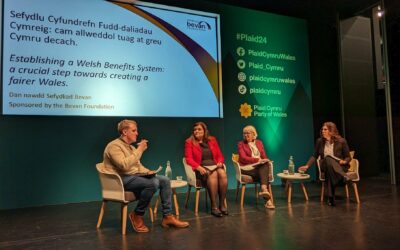 Bevan Foundation
Bevan Foundation 
In the fifth in a series looking at what the Bevan Foundation does, Victoria Winckler, Director of the think-tank, explains how it changes lives for the better.
One of the biggest challenges of all for any think-tank (aside from finding enough money to keep going) is translating the changes to policy or legislation that you have carefully developed into action on the ground.
It is action that really matters to the Bevan Foundation.
We can generate no end of reports, briefings, online articles or round-table discussions. But on their own they are not enough to make much difference to anything. That means we think carefully about how we persuade people that they need to take our recommendations on board.
The conventional way that think-tanks work is to target decision-makers, or more specifically, to target politicians. London think-tanks typically hold a lot of events in Parliament and at the various party conferences. This is critically important in Wales too – think-tanks need to engage politicians, from Cabinet Secretaries and Ministers to back-bench AMs – to stand a chance of getting a proposal adopted.
But we’re moving beyond that. When we have a solution we’re asking – who needs to change what and how best do we reach them? It’s obvious really, but if we want businesses to change what they do, we need to reach businesses in ways that they will listen to.
We’re getting a lot smarter at ‘influencing’.
We’re thinking about who we need to reach, and we’re thinking about how best to reach them too. That means not only thinking about the communication channels we use, but also the messages we give. At a recent training session organised by the Paul Hamlyn Foundation, we learned that a measured, rational and carefully-justified approach is most persuasive with government officials. But there are times, for example when an issue isn’t on the agenda or is being ignored, when waving placards and seeking shock-horror press headlines work better.
It also means exploring new ways of reaching people, for example delivering training, organising petitions or creating practical tool-kits. So if you see the Bevan Foundation doing new things as well as the more conventional launch events in the Senedd, you know why!
One of the biggest challenges of all is proving that you’ve made a difference.
It takes a considerable time for proposals to become accepted and included in public policy or legislation. And even when it is, it is unusual to be credited for developing the idea. More often, the proposal is ‘tweaked’ – maybe it is renamed, or maybe it is toned down or even extended! Only now, two years after the project ended, are some of the new taxes we recommended in the frame to be taken forward. On this occasion, the Cabinet Secretary kindly acknowledged that the ideas had emerged from the Bevan Foundation, but that is the exception.
Sometimes organisations act on our recommendations without us even knowing! We have found, by accident, at least two local authorities which are using our recommendations about reducing poverty in their own anti-poverty plans. We’re really pleased by this, but it does make it hard to ‘prove our worth’.
Our ‘modus operandi’ is different to the other think-tanks in Wales.
As I said in the first article in this series, there is no single model of a think-tank and in my view the more think-tanks Wales has, and the more varied their ways of working, the better. What I hope this article does is explain why we do what we do, and show that it is the result of a carefully thought-through strategy.
Our way of working is, unfortunately, relatively high-cost. We do the hard work of listening to ordinary people and reaching out to whoever is the right decision-maker. We do it carefully, using good research methodology, and we develop and plan a programme of ‘change-making’. It is a rare funder who is willing to support a think-tank, and fewer still who will fund what can sometimes be a lengthy time before results appear on the ground.
Wales faces unprecedented challenges. It is very clear to us that business as usual or the opinions of those already in power simply will not deliver the changes needed to meet those challenges. The Bevan Foundation exists to create that change, but we can only do it with YOUR help.
Victoria Winckler is Director of the Bevan Foundation. Find out more about how you can be part of the changes Wales needs.


